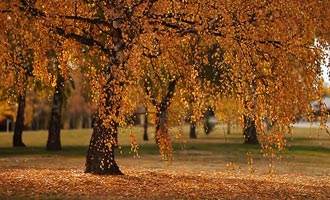
The Weather to Expect in New Zealand.
Please contact us and we will help you to organize your trip! It's free and without commitment.
- Read the post
- Details
- Advices
Presentation.
- 1A Unique Climate in the World.
- 2All Seasons in One Day!
- 3What Temperatures Can You Expect?
- 4Can You Go Swimming in New Zealand?
- 5What Clothes Should You Bring?
- 6What Is the Best Season to Visit New Zealand?
A Unique Climate in the World.

The variety of climates in New Zealand is amazing!
Located in the heart of the Pacific depressions, New Zealand has a variety of climates unique in the world. This is why it is difficult to get a precise idea of the country's weather.
Consider for example the South Island who knows the heat peaks of the country while its average temperatures remain cooler than North Island's ones. As for the wind direction, which can change in an instant and alter the forecasts of the day. However, there is no reason to fear the weather of New Zealand, because the country counts more sunny days than the South of France.
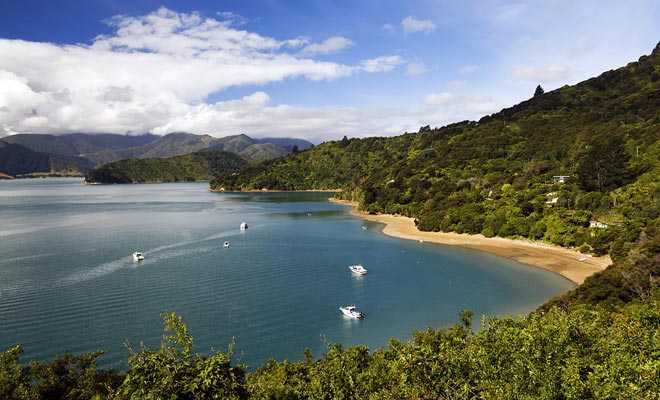
The weather is usually sunny.
So how should you dress? Is there hope to swim and during what season?
I will also give you some practical advice to plan your trip.
All Seasons in One Day!
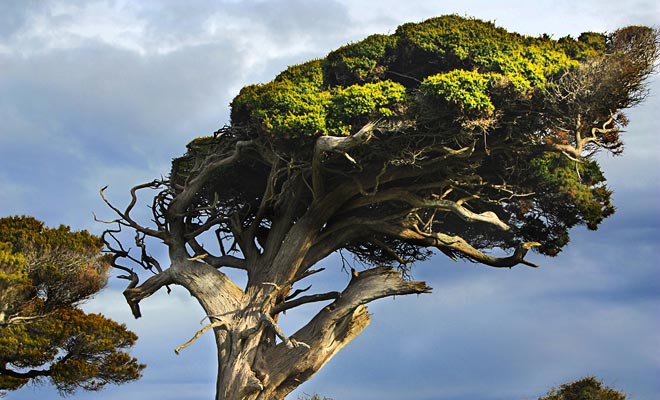
The temperatures are mild but the wind blows hard.
Subtropical in the northern part of the North Island, the climate is temperate and oceanic in the rest of the country. The South is experiencing harsh winters, unlike the North who enjoys mild temperatures all year round.
The influence of the Roaring Forties does not go unnoticed. Only the mountains stop the big gusts that sweep the country and its capital Wellington, nicknamed “Windy Welly”. However, summer and autumn are generally more stable and less prone to rainfalls.
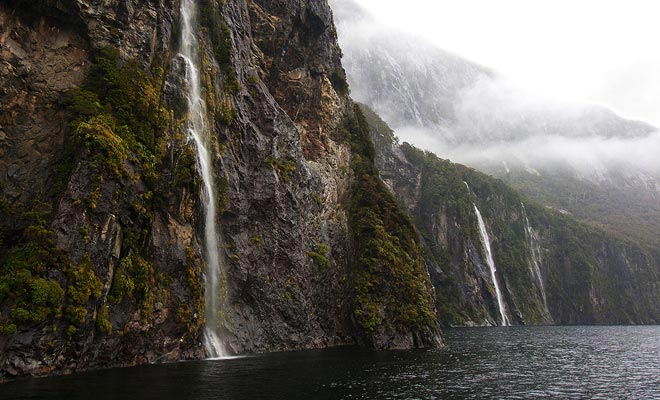
Some regions are marked by record rainfall.
Giving average pluviometry per season would completely hazardous... Take for example the South Island: It falls over seven meters each year on the West Coast. But the dry climate of the other provinces will give you similar statistics to the North Island!
Speaking about temperatures, we end up with the very same conclusion.
It would be tempting to simplify saying the North is warmer than the South, but the tormented relief gives birth to many microclimates.
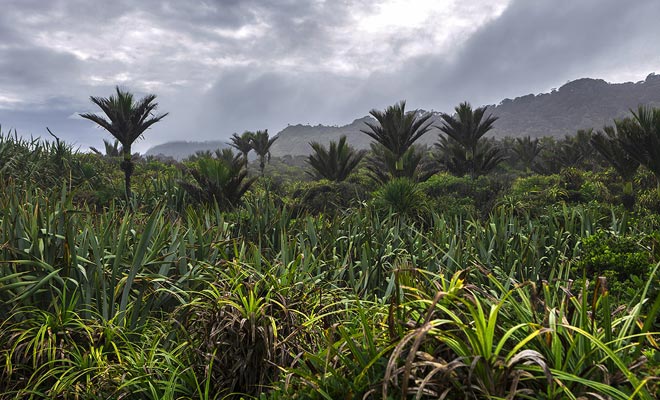
The subtropical climate allows the palm trees to grow.
At 50 km distance, the traveler sometimes finds himself in a completely different universe. Thus, the palm trees growing in the Paparoa National Park are not supposed to exist at such a low latitude. This is not a disadvantage as it gives the feeling to visit several countries instead of just one. This situation may nevertheless be tricky for the ones who want to organize a holiday.
This is why I'll help you by giving you details about the weather conditions and the temperatures of each season.
What Temperatures Can You Expect?
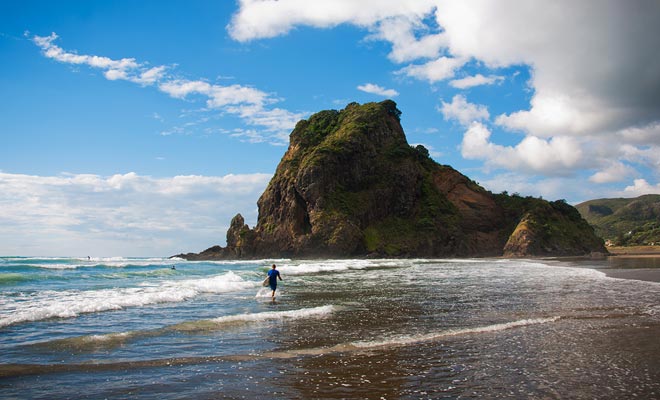
The climate is mild throughout the year, but it depends on each region.
New Zealand's seasons are reversed on this side of the planet. Here are the temperatures and the type of weather one can expect during each period of the year.
Remember that the temperatures indicated for each season are averages with minimum and maximum.
The summer has temperatures' peaks at 35° C and Christchurch even suffered a heat wave of 41° C in 1973!
SPRING (September to November)
| LOCATION | MINIMUM | MAXIMUM |
|---|---|---|
| North Island | 9° C | 18° C |
| South Island | 7° C | 17° C |
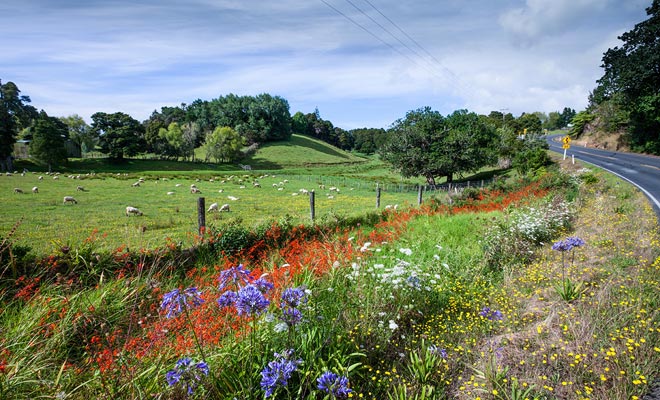
The climate is rather unstable in early spring.
This is the windiest season, with maximum rainfall and unstable weather across the entire territory. The weather improves in mid-October and one can travel and enjoy many discounts.
SUMMER (December to February)
| LOCATION | MINIMUM | MAXIMUM |
|---|---|---|
| North Island | 13° C | 26° C |
| South Island | 11° C | 21° C |
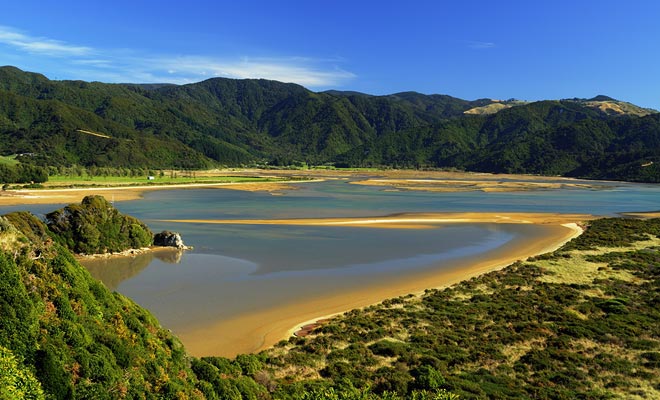
Summer months are recommended for outdoor activities.
With a stable and sunny climate, the summer is the best tourist season, and therefore the most expensive! Note that December is still quite wet in the northern part of the North Island.
AUTUMN (March to May)
| LIEU | MINIMUM | MAXIMUM |
|---|---|---|
| North Island | 10° C | 19° C |
| South Island | 8° C | 17° C |
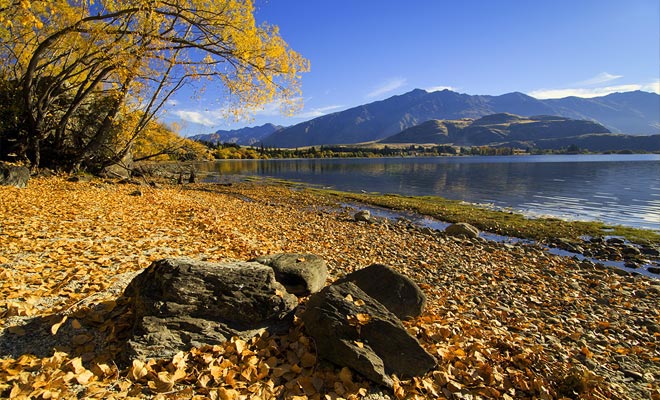
The beginning of autumn offers the best value for money.
The climate remains stable until mid-fall. If the temperatures get cooler, it is still sunny and mild until late April. Most summer activities are available and finally free from the crowd. Perhaps the best compromise to organize a stay.
WINTER (June to August)
| LIEU | MINIMUM | MAXIMUM |
|---|---|---|
| North Island | 6° C | 14° C |
| South Island | 2° C | 12° C |
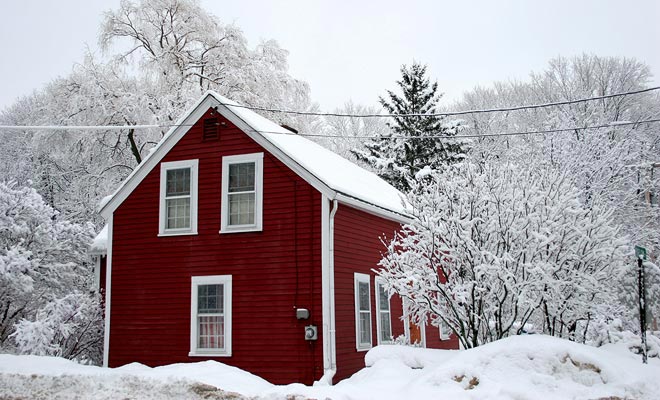
The country remains beautiful in winter and you can ski.
The North Island has mild but wet winters while temperatures suddenly drop of 10° C in the South Island. The rainfalls increase, but the snow falls mostly in the mountains or at the southern part of the country.
However, winters are not as underlined as in the Northern Hemisphere. Nature does not seem extremely different from one season to another, because most trees are covered with perpetual leaves.
Can You Go Swimming in New Zealand?
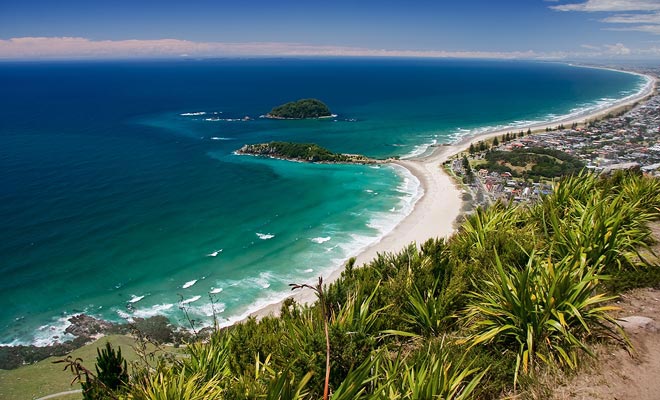
Only the summer months are suitable for swimming.
Some tourist guides do not hesitate to present New Zealand as a country where you can swim all year round. This is half true because if the beaches are exceptional, the water temperature is not ideal whatever the season.
To be honest, only the summer season is really suitable for swimming, mainly on the North Island. However, the sunniest days allow to swim in the lakes of the South Island.
Remember that the correct temperature to enter the water is around 23 ° C with 27 ° C being an ideal.
On the North Island the average water temperature approaches 24° C, but only the sunniest days will see the thermometer rising up to the expected 27° C.
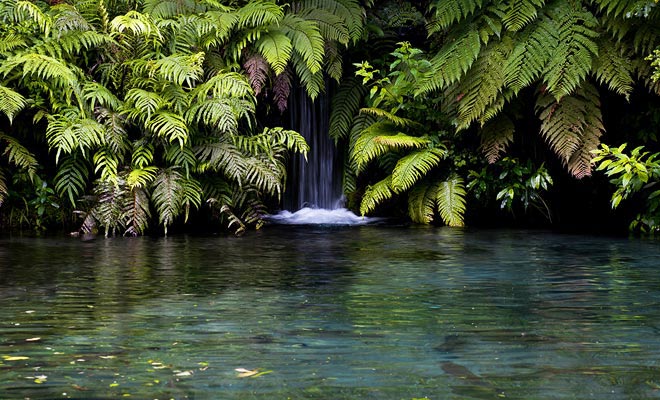
There are many hot springs.
Outside of the summer the temperature of the water decrease by 5 or even 8° C! You can still swim with some courage in the North but only with a wetsuit in the South.
Nordic guys loving the midnight swim will dive into the Milford Sound all the year, but I don't advise following their example if you don't want to freeze to death.
However, you can take your swimsuit all year. Many hot springs are heated by geothermal activity.
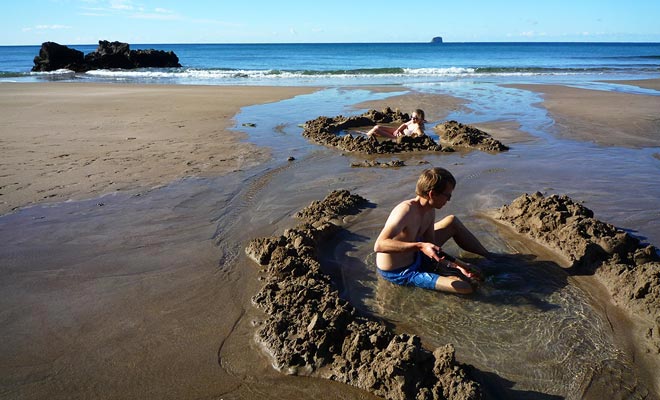
Hot Water Beach has a source at 65 ° C!
Just dig with a shovel in the sand to find a water at 65 °C at the famous Hot Water Beach. As for the pools of Hanmer Springs, one can swim here even under the winter's snow!
It is impossible to talk about the weather without saying few words about the clothes to wear. Some tips fortunately work in all circumstances.
What Clothes Should You Bring?
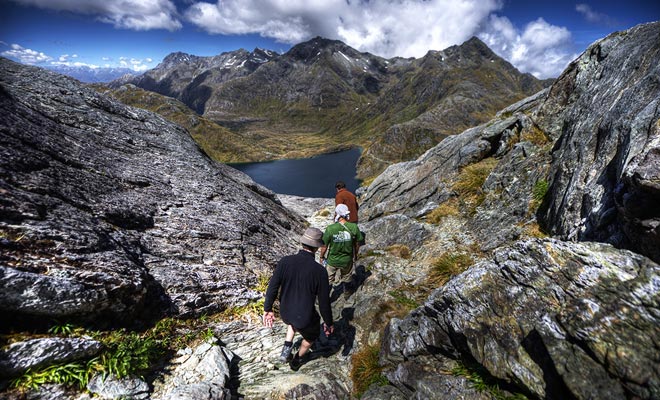
It will often be necessary to wear layers of light clothing.
Sun and rain often alternate in the sky in New Zealand. In order not sweat or shiver during a beautiful hike, it is sufficient to adopt a casual dress style.
Bring several layers of lightweight clothing to overlay depending on the weather.
A t-shirt completed by a sweater and a windbreaker do the job in the morning. Most of the afternoon take place in t-shirt only. You will add a layer again if the rain falls and you will put a sweater in the evenings.
This famous “oinion trick” is valid for all seasons except during winter when one should wear warmer clothes (especially on the South Island where temperatures are often negative by night).

Mountain hikes impose warm clothing.
Some mountain hikes require warmer clothes. This is a real dilemma for most travelers because a parka takes so many spaces, while being used only occasionally. To avoid overloading your backpack, you may prefer to bring a second sweater to cover you.
Travelers are often unaware that the ozone layer is lower over New Zealand. The absence of a hat and sunscreen are generally paid by severe sunburn. I think that I told you what you need to know about the climate.
You are now ready to choose a season for your holidays in New Zealand.
What Is the Best Season to Visit New Zealand?
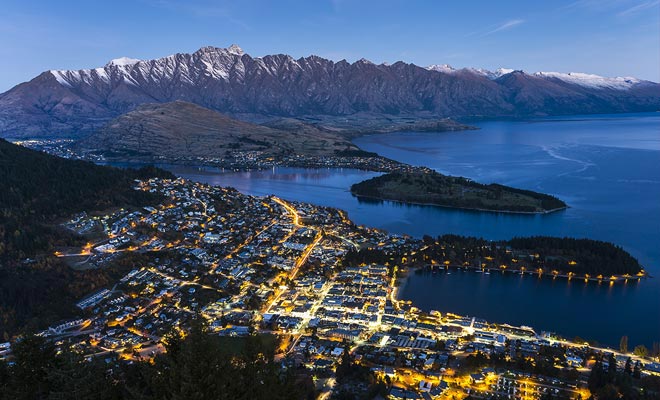
Some cities like Queenstown are enjoyable all year round.
I hesitated before giving temperatures on this page. You got average temperatures, but these are to be read as approximations to get an idea of the weather. The microclimates do not allow to be more specific.
One can almost say it will often be cold in mornings and evenings while the rest of the day is a matter of luck.
Bring a backpack to store your clothes and keep your hands free.
Honestly, do not expect to avoid the rain during a two-week stay.
Hurricanes do not reach New Zealand, but what remains generously sprinkles the country.
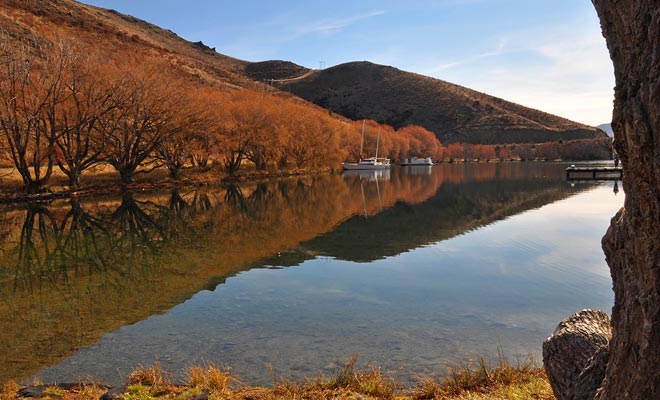
If you can, travel early in the fall.
However, the chances of enduring bad weather during full holidays are quite low during the high season. To save money, you can travel in the spring, at least from mid-October. Personally, I enjoy the early autumn (March) with its bright colors and sunny climate.

Winter is especially interesting for winter sports enthusiasts.
Of course, summer is the best season for beach activities. As the seasons are reversed, you can spend the Christmas holiday swimming with dolphins! You can exclude the winter for a first trip to the land of kiwis, but the opportunity to ski in dream landscapes is to be considered for a second stay (trees do not lose their leaves in New Zealand, the country remains beautiful).
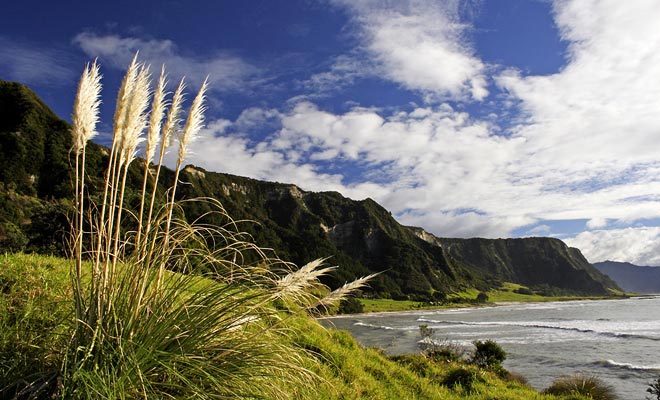
Each island has an original and very varied relief.
Impossible to choose an island rather than another. If sunny days are more numerous in the North, the South offers the most varied landscapes. The change of scenery is guaranteed.
I suggest you read my articles about the best time to travel and the art of packing your suitcase (you will also find other tips to organize your stay, like the school holidays periods you should avoid.)


Questions & Answers.

What can I do for you? Beyond the traditional temperature question, I can also suggest the appropriate activities for each season.
- All topics ... 13 answers in total
- Climate 6 answers
- Temperatures 4 answers
- Appropriate Clothing 3 answers
Climate
- Which country does the climate of New Zealand look like?
The New Zealand weather shares some similarities with the Ireland's.
- Are there hurricanes in New Zealand?
Rest assured, the hurricanes do not reach New Zealand.
- Can we visit the country even in winter?
Yes, especially since most trees don't lose their leaves. The panoramas remain spectacular and you will enjoy discounted rates.
- What is the best season to come?
In terms of temperature and climate stability, it is better to visit the country in summer (December to February). But the end of spring and the beginning of autumn are quite acceptable and less costly.
- Is the weather nice in this country?
Statistically, New Zealand has more sunny days than France, for example...
- Does it often rain as it is claimed?
In some regions such as Fiordland, it rains every other day if not two days out of three. Everywhere else, the country is known for its brief rains that leave room for a big blue sky.
Temperatures
- What temperature can we expect in New Zealand?
The answer is on this same page. See our temperature chart for each season of the year.
- Which island to choose to have the best climate?
The North Island is warmer than the South Island (some degrees of differences). But there are exceptions related to micro climates.
- On which island can you swim?
Except in the lakes of Otago in the middle of summer, where sometimes in Abel Tasman, the water is too fresh to bathe without any combination on the South Island. On the North Island, swimming is pleasant in summer only.
- Why should we be wary of the sun in NZ?
The ozone layer is thinner than in Europe and it is easier to catch sunburn.
Appropriate Clothing
- How to dress during the stay?
Opt for lightweight and, if possible, waterproof clothing to cover any eventuality. The jeans are to be avoided for hiking, as they take hours to dry.
- Should we wear warm clothes?
Even in summer, the nights are cool, especially if you are hiking in the mountains or the seaside. Take a good wool sweater, it will also be useful if you visit caves like Waitomo.
- What should I put in my suitcase?
See the list on this page. The ideal is to travel light and use laundromats.

